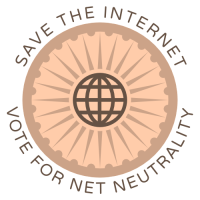Battle for Open Internet Scores With Flipkart U-Turn
 Internet users in India are worried they could be forced to pay for using different services (photo: SaveTheInternet.in)
Internet users in India are worried they could be forced to pay for using different services (photo: SaveTheInternet.in)
In the ongoing battle for net neutrality, Flipkart has pulled out of its reported tie-up with Airtel's service Airtel Zero after the e-commerce company faced significant backlash on social media this past week.
Flipkart said in a statement that it "will be walking away from the ongoing discussions with Airtel for their platform Airtel Zero" and committing themselves to the "larger cause of Net Neutrality in India".
This is a major win for internet users, who are worried about plans that could force users to pay for using different services. Net neutrality is the principle that guarantees consumers equal and non-discriminatory access to all data, apps and services on the internet.
Telecom regulator TRAI had sparked off online protests with its consultation paper that sought views from the public on regulating 'over the top' service providers like Whatsapp and Skype.
Around 300,000 emails have already been sent by users to TRAI since Saturday, urging it to protect open internet in India. This is the biggest response to any consultation paper that the regulator has ever floated.
"This is completely unprecedented. We thought we'll get about 15,000 emails in 10 days," said Kiran Jonnalagadda, one of the people behind the campaign.
Flipkart faced the brunt of anger on social media earlier this week, after it was reported that the company was planning to join Airtel Zero, where companies buy data and offer it to their consumers for free.
Critics say this would violate net neutrality since the cost of access automatically becomes higher for apps that are not enrolled on the platform.
This is crucial in a price-conscious market like India where people tend to prefer "free" offerings over paid offerings.
Earlier this year, the US FCC approved landmark internet rules that would prevent broadband providers from separating online traffic into slow and fast lanes. This prohibits service providers from blocking lawful content or slowing one service to support a rival.
Airtel has defended Airtel Zero and promised that it would not introduce slow lanes of access, but most internet users are not convinced.
The wave of consumer backlash against Flipkart – with many users giving its apps 1-star ratings – forced the company to pull out of Airtel Zero.
“We at Flipkart have always strongly believed in the concept of #NetNeutrality, for we exist because of the Internet,” Flipkart tweeted on Tuesday.
As support for net neutrality grows, political parties are falling over themselves to support internet freedom.
“Congress completely supports net neutrality, Internet freedom must not be compromised,” said Congress leader Ajay Maken. “If ISPs control where you should shop from, then consumers will be powerless.”
The government has also backed an open internet. Telecom Minister Ravi Shankar Prasad has said the common man should be able to access it without discrimination.
A six-member panel set up by telecom department is expected to submit its recommendations next month "on the whole gamut of net neutrality objective, its benefits, advantages and limitations including the regulatory and technical issues."
- Karan Singh
To Learn More:
Flipkart Pulls Out of Airtel Deal Amid Backlash Over Net Neutrality (NDTV)
Flipkart pulls out of Airtel's net neutrality violating Airtel Zero (by Vikas SN, Economic Times)
1.5 lakh mails and counting: India lodges one of its biggest online protests over net neutrality (by Jayadevan, Economic Times)
After Flipkart withdrawal from Airtel Zero, politicians reiterate support for net neutrality (Economic Times)
Battle for open internet: Will you have to pay for WhatsApp, YouTube? (by Pranav Dixit, Hindustan Times)
US FCC Votes in Favour of Net Neutrality to Ban 2-Speed Internet (AFP)
- Top Stories
- Controversies
- Where is the Money Going?
- India and the World
- Appointments and Resignations
- Unusual News
- Latest News
- India College Chain’s Expansion into U.S. Draws Opposition from Massachusetts Officials over Quality of Education
- Milk Shortages in India Tied to Release of New Movies Featuring Nation’s Favorite Stars
- Confusion Swirls around Kashmir Newspaper Ban in Wake of Violent Street Protests
- Polio-Free for 5 Years, India Launches Vaccine Drive after Polio Strain Discovery
- New Aviation Policy Could Increase Service, Lower Ticket Prices






Comments